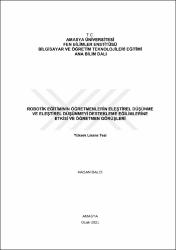| dc.contributor.advisor | Erdoğmuş, Feray Uğur | |
| dc.contributor.author | Balcı, Hasan | |
| dc.date.accessioned | 2022-03-09T14:55:56Z | |
| dc.date.available | 2022-03-09T14:55:56Z | |
| dc.date.issued | 2021 | |
| dc.identifier.uri | https://tez.yok.gov.tr/UlusalTezMerkezi/TezGoster?key=9MiDp3x86xrwjpi5-14w-bJ7W93TksXPsz5RJLa7Cue8ndjBRQnUcmcFl36FdTj- | |
| dc.identifier.uri | https://hdl.handle.net/20.500.12450/1739 | |
| dc.description.abstract | Bu çalışmanın amacı eğitsel robotik uygulamalarının öğretmenlerin eleştirel düşünme ve eleştirel düşünmeyi destekleme eğilimini etkisini ortaya koymak ve öğretmen görüşlerini belirlemektir. Açıklayıcı sıralı karma araştırma deseni kullanılarak yapılan araştırmanın nicel kısmında ön test-son test kontrol gruplu yarı deneysel araştırma deseni kullanılmıştır. Nitel kısmında ise durum çalışması yapılmıştır. Deneysel süreç bittikten sonra öğretmenlerle eğitsel robotik uygulamaları, eleştirel düşünme eğilimleri ve eleştirel düşünmeyi destekleyen öğretmen davranışları hakkında görüşme gerçekleştirilmiştir. Bu araştırmanın çalışma grubunu 2018-2019 yılı bahar döneminde Amasya'da Milli Eğitim Bakanlığı'na bağlı devlet okullarında görev yapmakta olan ve daha önceden eğitsel robotik uygulamaları eğitimi almayan farklı branş öğretmenlerinden oluşmaktadır. Araştırmanın örneklemi, 'Temel Robotik' eğitimine katılan 34 deney ve 'Eğitsel Oyun Tasarımı' eğitimine katılan 30 da kontrol grubu öğretmeni olmak üzere toplamda 64 öğretmenden oluşmaktadır. Araştırmanın nitel çalışma grubunda ise deney grubundan gönüllü olan 10 öğretmen bulunmaktadır. Araştırmanın veri toplama araçları 5'li likert tipine göre hazırlanan "Eleştirel Düşünme Eğilimi (EDE)" ve "İlköğretim Öğretmenlerinin 'Eleştirel Düşünmeyi Destekleme Davranışlarının Değerlendirilmesi (EDEÖDE)" ölçekleridir. Araştırma sonucunu daha derinlemesine incelemek amacıyla ayrıca yarı yapılandırılmış görüşme formu hazırlanmıştır. Araştırma sonuçlarına göre; araştırmaya katılan öğretmenlerin eleştirel düşünme eğilimleri ve eleştirel düşünmeyi destekleme eğilimlerinin cinsiyete, yaşa ve branşa göre anlamlı bir farklılaşma göstermediği sonucuna ulaşılmıştır. Araştırmaya katılan öğretmenlerin eleştirel düşünme eğilimleri ve eleştirel düşünmeyi destekleme eğilimlerinin mesleki tecrübeye göre anlamlı bir farklılaşma gösterdiği sonucuna ulaşılmıştır. Eğitsel robotik uygulamalarının öğretmenlerin eleştirel düşünme eğilimleri ve eleştirel düşünmeyi destekleme eğilimleri üzerine anlamlı bir etkisi yoktur. Fakat öğretmenler eğitsel robotik uygulamalarının eleştirel düşünme eğilimlerini ve eleştirel düşünmeyi destekleme eğilimlerinde olumu etkilediğini düşünmektedirler. Araştırmanın nitel bulgularına göre; öğretmenler okullarda tek düze birey yetiştirilmekten kaçınılmasını, çocukların hayal dünyalarına müdahale edilmemesi gerektiğini ve var olan sorunların çözümünde farklı bakış açılarıyla bakarak çözüm üretmelerinin öğrencilerin eleştirel düşünme eğilimine sahip olmaları açısından önemli olduğunu düşünmektedirler. Ayrıca, öğretmenler eğitsel robotik uygulamaları ve benzer eğitimlerin daha uzun soluklu olması, daha sık olması, basitten zora doğru ilerlemesi gerektiği belirtilmiştir. Öğretmenleri eğitimlerin seviyelerine göre gruplayarak verilmesinin de daha uygun olacağı öğretmenler tarafından düşünülmektedir. Son olarak; Öğretmenlerin etkili eğitsel robotik uygulamaları için öncelikle eğitim verilecek ortamın geniş bir ortamda olması, eğitimde kullanılacak materyallerin yeterli sayıda olması gerektiğini belirtmişlerdir. Gelecek çalışmalarda farklı ölçekler kullanılabilir. Son olarak aynı ölçekler öğretmen adayları veya farklı kategorideki öğrencilerle tekrarlanabilir. | en_US |
| dc.description.abstract | The aim of this study is to reveal the effect of educational robotic applications on teachers 'tendency to support critical thinking and critical thinking and to determine teachers' opinions. A pretest-posttest control group quasi-experimental research design was used in the study using the embedded mixed research design. In the qualitative part, a case study was conducted. After the experimental process was over, a meeting was held with teachers about educational robotic applications, critical thinking dispositions and teacher behaviors that support critical thinking The working group of this research consists of different branch teachers who have been working in public schools affiliated to the Ministry of National Education in Amasya in the spring term of 2018-2019 and who have not previously received training in educational robotics applications. The sample of the research consists of a total of 64 teachers, including 34 experiments participating in 'Basic Robotics' training and 30 control group teachers participating in 'Educational Game Design' training. In the qualitative study group of the study, there are 10 teachers who volunteered from the experimental group. The data collection tools of the research are "Critical Thinking Tendency" prepared according to the 5-point likert type and "Assessment of Critical Thinking Supporting Behaviors of Primary School Teachers Scales". A semi-structured interview form was also prepared in order to examine the research result in more depth. According to the research results; It was concluded that teachers' critical thinking tendency and tendencies to support critical thinking did not differ significantly according to gender, age and branch. It was concluded that the teachers' critical thinking tendency and their tendencies to support critical thinking differ significantly according to their professional experience. Robotic education has no significant effect on teachers' critical thinking tendency and tendencies to support critical thinking. However, teachers think that robotic education affects their critical thinking tendency and their tendency to support critical thinking. According to the qualitative findings of the research; Teachers think that it is important to avoid raising monolithic individuals in schools, not to interfere with children's imaginations, and to find solutions by looking at different perspectives in solving existing problems in terms of students' critical thinking tendency. In addition, teachers stated that robotics training and similar trainings should be longer, more frequent, and progress from simple to difficult. It was stated that it would be more appropriate to group the teachers according to their level of education. Finally; The teachers stated that for effective robotics training, the educational environment should be spacious and the materials to be used in education should be sufficient. Different scales can be used in future studies. Finally, the same scales can be repeated with prospective teachers or students in different categories. | en_US |
| dc.language.iso | tur | en_US |
| dc.publisher | Amasya Üniversitesi | en_US |
| dc.rights | info:eu-repo/semantics/openAccess | en_US |
| dc.subject | Eğitim ve Öğretim | en_US |
| dc.subject | Education and Training | en_US |
| dc.title | Robotik eğitiminin öğretmenlerin eleştirel düşünme ve eleştirel düşünmeyi destekleme eğilimlerine etkisi ve öğretmen görüşleri | en_US |
| dc.title.alternative | The effect of robotic education on teachers 'critical thinking and tendencies to support critical thinking and teachers' opinions | en_US |
| dc.type | masterThesis | en_US |
| dc.department | Enstitüler, Fen Bilimleri Enstitüsü, Bilgisayar ve Öğretim Teknolojileri Eğitimi Ana Bilim Dalı | en_US |
| dc.identifier.startpage | 1 | en_US |
| dc.identifier.endpage | 132 | en_US |
| dc.identifier.yoktezid | 665030 | en_US |
| dc.institutionauthor | Balcı, Hasan | |


















